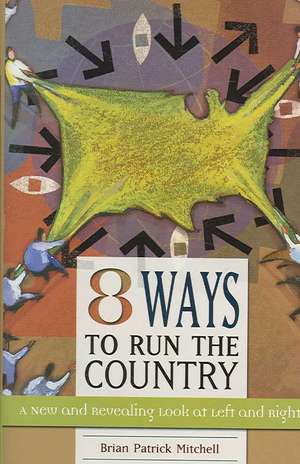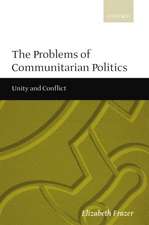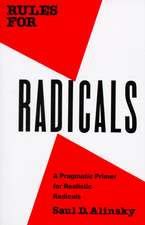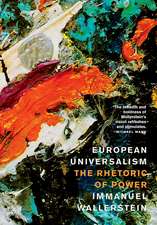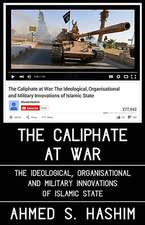Eight Ways to Run the Country: A New and Revealing Look at Left and Right
Autor Brian Patrick Mitchellen Limba Engleză Hardback – 29 noi 2006 – vârsta până la 17 ani
Preț: 363.64 lei
Preț vechi: 478.81 lei
-24% Nou
Puncte Express: 545
Preț estimativ în valută:
69.59€ • 71.90$ • 57.89£
69.59€ • 71.90$ • 57.89£
Carte tipărită la comandă
Livrare economică 19 martie-02 aprilie
Preluare comenzi: 021 569.72.76
Specificații
ISBN-13: 9780275993580
ISBN-10: 0275993582
Pagini: 176
Dimensiuni: 156 x 235 x 20 mm
Greutate: 0.44 kg
Ediția:New.
Editura: Bloomsbury Publishing
Colecția Praeger
Locul publicării:New York, United States
ISBN-10: 0275993582
Pagini: 176
Dimensiuni: 156 x 235 x 20 mm
Greutate: 0.44 kg
Ediția:New.
Editura: Bloomsbury Publishing
Colecția Praeger
Locul publicării:New York, United States
Notă biografică
Brian Patrick Mitchell is the former Washington Bureau Chief of Investor's Business Daily. As a veteran political reporter and author, Mitchell has appeared on dozens of television and radio shows, including Face the Nation, Larry King Live, Today, Crossfire, and Nightline. He also has been a guest speaker at Harvard's Kennedy School of Government, the University of Pennsylvania, the University of Connecticut, and Catholic University of America.
Cuprins
Preface1. Schizocracy in America2. Beyond Left and Right3. For Common Things: The Communitarian4. Change Is Good: The Progressive5. Question Authority: The Radical6. Framework for Utopia: The Individualist7. Breaking the Clock: The Paleolibertarian8. For the Permanent Things: The Paleoconservative9. God and Country: The Theoconservative10. Mugged by Reality: The Neoconservative11. Postmodern PopulismNotesIndex
Recenzii
Whether a pro-politico, a C-Span junkie, or a political neophyte, Brian Mitchells Eight Ways to Run the Country is the best shortcut I have seen to really knowing what you are talking about when it comes to the complicated 21st century political landscape. power in these increasingly confusing political times.
Veteran reporter Mitchell refines current conventional wisdom about the Right and the Left in American politics. He begins by exploring the historical context for the current political positions and personalities, and the influence of economic and social contexts. Mitchell identifies four main political traditions (republican constitutionalism, libertarian individualism, progressive democracy, and plutocratic nationalism), that have been boiled down to the Left and the Right, in gross terms. These traditions have actually given rise to eight distinct political perspectives, and Mitchell devotes a chapter to each..Readers will enjoy trying to find themselves on the various scales provided.
Dissatisfied with prior schemes for categorizing political ideologies, Mitchell proposes his own typology. He begins by boiling down political differences down to support or opposition to arche (the concept of rank) and kratos (the use of force by the state and others) and then deriving from this distinction the four political traditions of the Anglo-American experience: republican constitutionalism, libertarian individualism, progressive democracy, and plutocratic nationalism. Further identifying intermediate steps between them, he argues that the contemporary American political scene can be characterized as consisting of eight political perspectives: individualist, paleolibertarian, paleoconservative, theoconservative, neoconservative, communitarian, progressive, radical, and individualist. He offers a chapter on each of these perspectives, detailing how they are the result of differing attitudes towards arche and kratos and the positions this leads them towards.
What to my mind makes his book valuable is less its reconceptualization of the categories of left and right than its usefulness as a political and philosophical primer for those who would like to understand the ideological landscape in America..[i]f you'd like to understand and make sense of the various branches of conservatism and libertarianism, as well as the various divisions that exist to this day on the left, Brian Patrick Mitchell has written a useful and worthy introduction that will entertain and inform. Before you know it, you'll know all the lingo, the key people, and a brief history of all these schools of thought. Not bad for such a quick read.
Veteran reporter Mitchell refines current conventional wisdom about the Right and the Left in American politics. He begins by exploring the historical context for the current political positions and personalities, and the influence of economic and social contexts. Mitchell identifies four main political traditions (republican constitutionalism, libertarian individualism, progressive democracy, and plutocratic nationalism), that have been boiled down to the Left and the Right, in gross terms. These traditions have actually given rise to eight distinct political perspectives, and Mitchell devotes a chapter to each..Readers will enjoy trying to find themselves on the various scales provided.
Dissatisfied with prior schemes for categorizing political ideologies, Mitchell proposes his own typology. He begins by boiling down political differences down to support or opposition to arche (the concept of rank) and kratos (the use of force by the state and others) and then deriving from this distinction the four political traditions of the Anglo-American experience: republican constitutionalism, libertarian individualism, progressive democracy, and plutocratic nationalism. Further identifying intermediate steps between them, he argues that the contemporary American political scene can be characterized as consisting of eight political perspectives: individualist, paleolibertarian, paleoconservative, theoconservative, neoconservative, communitarian, progressive, radical, and individualist. He offers a chapter on each of these perspectives, detailing how they are the result of differing attitudes towards arche and kratos and the positions this leads them towards.
What to my mind makes his book valuable is less its reconceptualization of the categories of left and right than its usefulness as a political and philosophical primer for those who would like to understand the ideological landscape in America..[i]f you'd like to understand and make sense of the various branches of conservatism and libertarianism, as well as the various divisions that exist to this day on the left, Brian Patrick Mitchell has written a useful and worthy introduction that will entertain and inform. Before you know it, you'll know all the lingo, the key people, and a brief history of all these schools of thought. Not bad for such a quick read.
